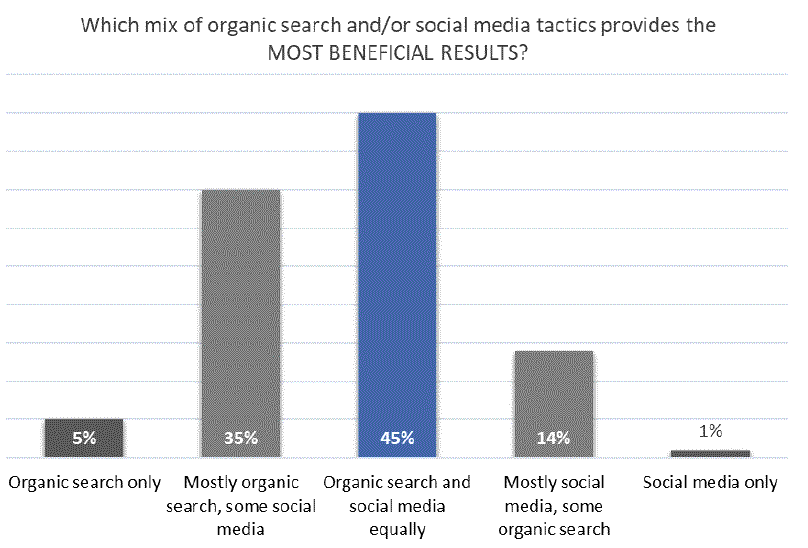You’ve probably noticed, that most of the time when you use Google to search for something online, that very few of the results returned are social media links. It’s true that social media links are a very low priority for Google when they are indexing the web. This doesn’t mean you shouldn’t bother with it. Search engines look at the size of your social communities to add authenticity to your business, and this adds weight to your argument of being listed higher up in the index for your preferred search terms.
Ascend2 is a team of research and marketing professionals providing Research-Based Marketing exclusively for marketing technology companies and digital marketing agencies. They recently released a report titled ‘For Strategies, Tactics and Trends: Organic Search & Social Media’ that says:
There is no question that social shares linked to quality content on your website or blog will improve organic search rankings as well as traffic. SEO benefits from social media, and vice versa.

It is not going to matter if your small business is offering goods or services that can only be sold locally. However, if you have a product you can ship, like custom clothing for pets, then you probably need a larger base of customers to be profitable. With permission from Ascend2, you can download this report here.
Gulzar Asma and Maqbool Misbah write, “Social media encompasses a wide range of online, forums including blogs, company sponsored discussion boards & chartrooms, consumer to consumer e mail, consumer product or service rating websites & forums, internet discussion boards & forums, moblogs, (sites containing digital audio, images, movies, or photographs), and social networking websites, to name a few.” When one thinks about social media, a lot of people think of Facebook and Twitter, but there is more to it than these websites. Basically, wherever you have the opportunity to speak with prospects, customers and any other general audience, you are reaching out to help brand yourself and business, even if the main goal isn’t to make a sale.
One might think, why bother, if the immediate result isn’t a sale? A sale could come later, but answering questions proves a certain transparency and willingness to engage openly. It helps to develop trust. The rule of thumb used to be that a potential customer had to be exposed to your marketing message at least three times before they would make an inquiry. Unfortunately this rule is more applicable to the offline world rather than online; online the equivalency to this rule might be closer to ten times.
It can be hard to discipline yourself to take the time away from more important matters at hand. It’s been suggested that creating a schedule for social media at a specific time of the day can be beneficial. Two of the most important pieces of the puzzle are persistence and consistency. People get used to seeing your posts, and some will look forward to them. Your return on investment won’t be realized until after a sustained effort.
You can count on wasting about ninety percent of your time on social media. For that matter, ninety percent of your posts should be something other than ads. If all you post are ads, you will find it hard to keep followers. The whole idea is to engage people. It could be business related, hobbies, travel, sports, news. It’s best to find topics your target market might be interested in. Perhaps after twenty posts, you could announce a contest winner on your website — something that could trigger readers to follow your link to get another look at what you do.
Gulzar Asma and Maqbool Misbah’s article was written for ‘RESEARCH REVIEW International Journal of Multidisciplinary’, where they wrote, “Social media marketing has become the most powerful mode for companies seeking to reach out to their prospects and customers.” You can establish one-on-one conversations, build relationships, increase sales and drive more traffic to your website. It’s important to do it right. You can download the report (with permission) here.
